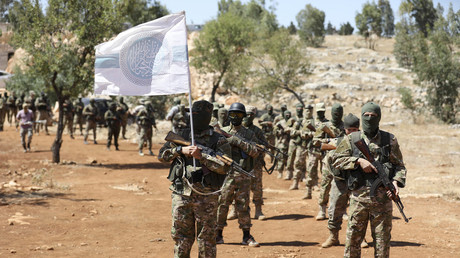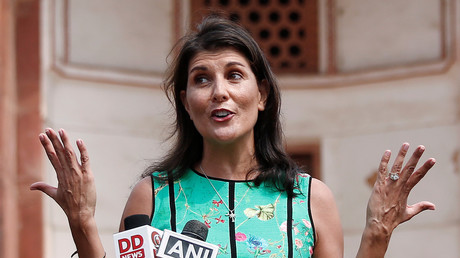Tri-party talks in Tehran may decide outcome of Syria war
The leaders of Russia, Iran and Turkey are to hold talks in Tehran to discuss how to move forward in Syria. Damascus is gearing up for a major military operation while the US threatens it with intervention.
Iran’s President Hassan Rouhani will host his Russian and Turkish counterparts Vladimir Putin and Recep Erdogan on Friday. The three parties are behind the so-called Astana process, which aims to deescalate the violence in Syria to a level, which would allow a political transition and a sustainable end of the seven-year-old war in the country. It is the third meeting of this kind and is expected to be dominated by Syria’s Idlib governorate.
Idlib debacle
Located in western Syria, Idlib is the last major stronghold of anti-government armed groups, many of them hardcore jihadists. The region is dominated by Hayat Tahrir al-Sham, an Al Qaeda-linked terrorist group. The total number of the extremist forces in the area is estimated at between 10,000 and 60,000, with some 3.5 million people living there.
The meeting in Iran comes amid a disagreement on whether the jihadists – who used the governorate as a staging ground for regular attacks on other parts of Syria – can be defeated there without a major military operation. The Syrian government seems to be determined to launch one, with air support from Russia and ground support from Iranian paramilitaries and military advisors. Turkey, which borders Idlib, objects, saying it would cause a major exodus of civilian population into Turkey, which would be used by the jihadists to sneak into the country.
But if successful, an offensive in Idlib would result in the defeat of the last major jihadist force in Syria. It would not be an end of divisions in the country. Large parts in the north-east controlled by Kurdish militias backed by the United States and a US military base is still present on the Syrian-Jordanian border. Neither would it resolve Israel’s conflict with Iranian forces on Syrian territory. But it would eliminate a force, for which an end of violence and negotiations with Damascus is not an option – an outcome that proponents of the potential operation believe would give an impetus to the UN-backed peace talks in Geneva.
“I believe that this meeting in Tehran will prepare the international and regional atmosphere for the upcoming military operation in Syria. After the Syrian army takes all of Idlib, we will start a countdown towards the end of the Syrian crisis,” said Jamal Wakeem, a professor of history and international relations at Lebanese University in Beirut.
A deal for Erdogan
Turkey’s concerns over a military confrontation at its border is understandable, but its counter-proposal voiced on Wednesday by Foreign Minister Mevlut Cavusoglu – to somehow separate terrorists and civilians through intelligence work – does not seem to be very practical. The jihadists had several years to prepare for a possible attack and have a record of using civilian population as de-facto human shields. Every successful siege in Syria, including the US and Kurdish attack of Raqqa, resulted in heavy loss of civilian lives and damage to civilian infrastructure while US promises to separate jihadists from so-called moderate rebels proved futile.
Russia and Iran will likely try to persuade Turkey in Tehran that an offensive in Idlib is necessary while trying to offer some solutions to Ankara’s concerns, said Huseyin Bagci, a professor of international relations at Ankara’s Middle East Technical University.
“The Turkish government is trying to get security for those radical groups which Turkey supported in the past. So a new deal… will be on how those people would be evacuated from Idlib,” he said.
From chemical blackmail to outright threats
As the preparations for an offensive are underway, vocal protest against it have been coming from Washington. The US seems determined that the Syrian troops will not be able to refrain from using chemical weapons in Idlib and threatened a military retaliation similar to the one in April during a Syrian attack in Douma. US envoy to the UN Nikki Haley went as far as attributing such an attack to Damascus even before it happened.
“It happened in the past when the Syrian government was accused of using chemical weapons at a time when the Syrian government appeared to be winning and had no reason to use chemical weapons,” pointed out journalist and author Adel Darwish.
The Russian military previously warned that a false flag chemical weapons attack was in preparation by Jabhat Fateh al-Sham with the help of the British intelligence. The US Defense Secretary James Mattis stated the US has ‘zero intelligence’ on possession of chemical weapons capability by the “opposition” in Syria or cases of its use by anyone but Damascus. He seems to be contradicting previous statements by US officials, which explicitly accused Hayat Tahrir al-Sham of using chemical weapons.
What State once said about rebels using chemical weapons:
“Tactics of ISIS, Hayat Tahrir al-Sham and other violent extremist groups include the use of suicide bombers, kidnapping, small and heavy arms, improvised explosive devices, and chemical weapons.” https://t.co/2sWluzkVc7
— Max Abrahms (@MaxAbrahms) September 5, 2018
The US attacked Syrian forces over alleged use of chemical weapons twice already. If a third installment is anything like the previous two, it would be unlikely to disrupt an offensive in Idlib in a serious way. A more large-scale attack however would bring the US much closer to a military confrontation with Russia, which has its military personnel embedded with the Syrian units.
A day after Nikki Haley suggested Syrian could “go the route of taking over Syria,” the US ambassador issued statement calling on Assad to halt attack on Civikians in Idlib. pic.twitter.com/JVKrkCXeYL
— columlynch (@columlynch) September 5, 2018
Over the past few days Washington’s threat against Damascus seemed to be shifting focus from chemical weapons to any major offensive in Idlib. This will certainly be a major factor during the Tehran talks, but the US determination to intervene in Syria without a formal pretext remains under question.
Subscribe to RT newsletter to get stories the mainstream media won’t tell you.







Comments are closed.